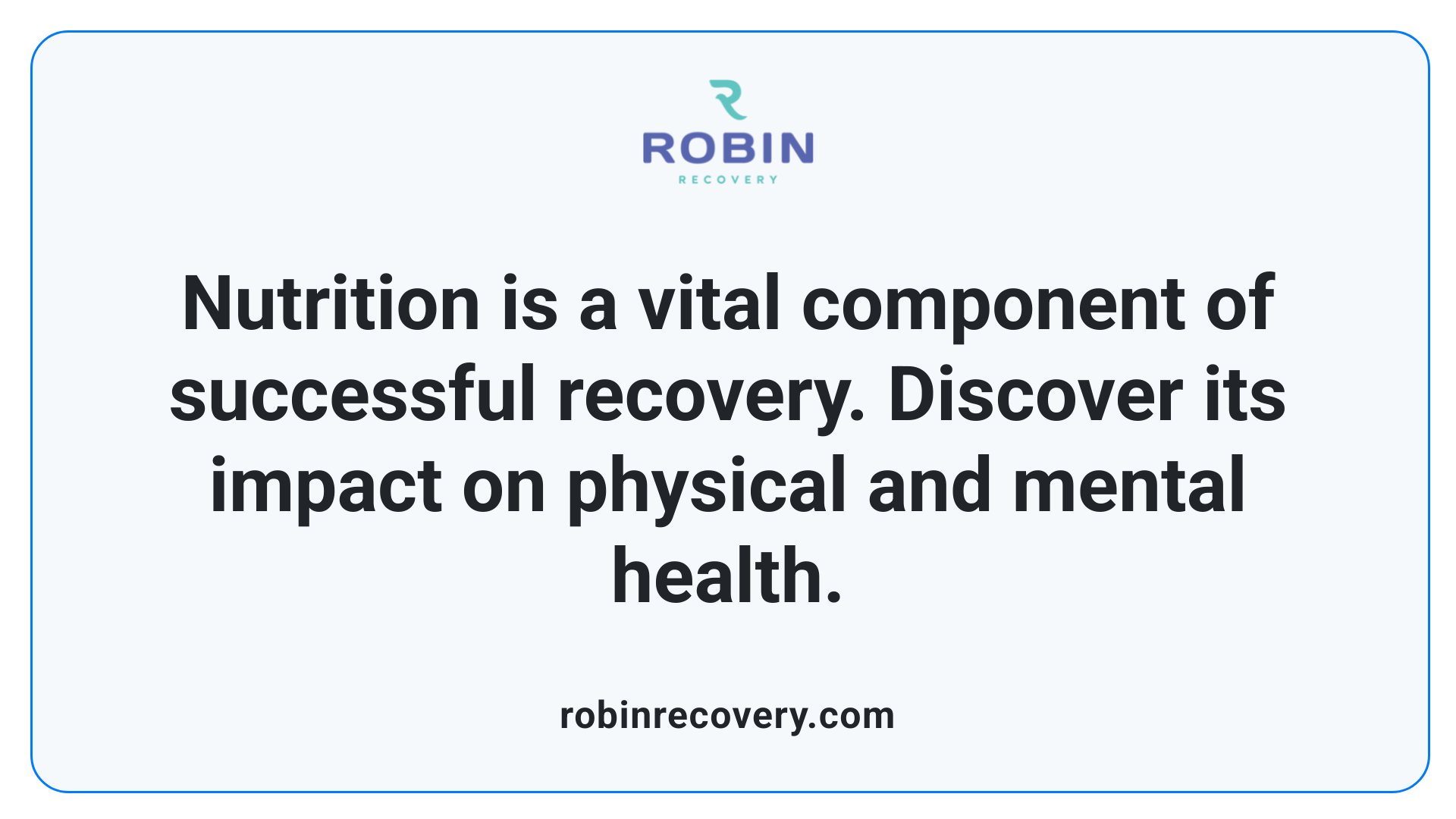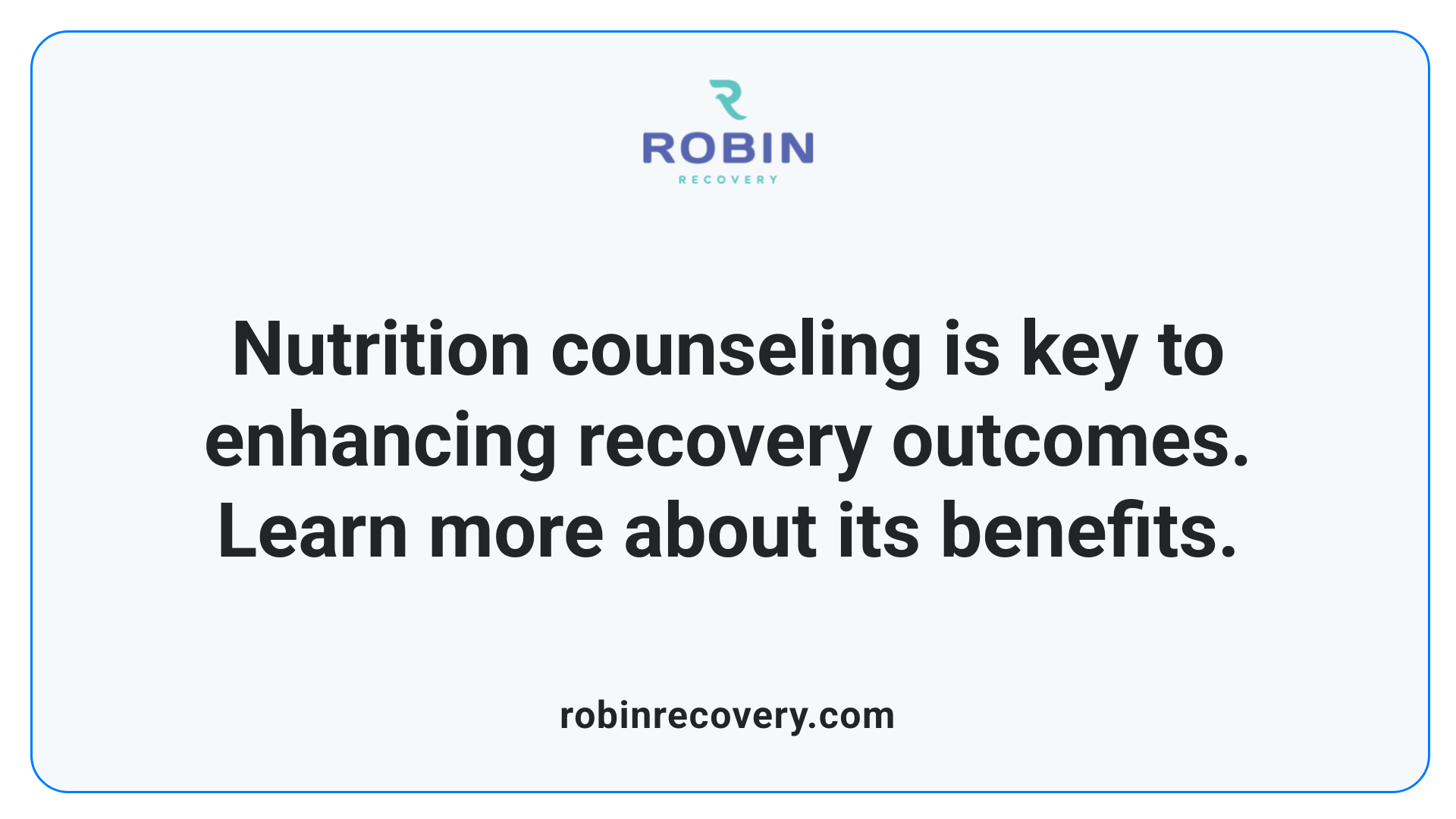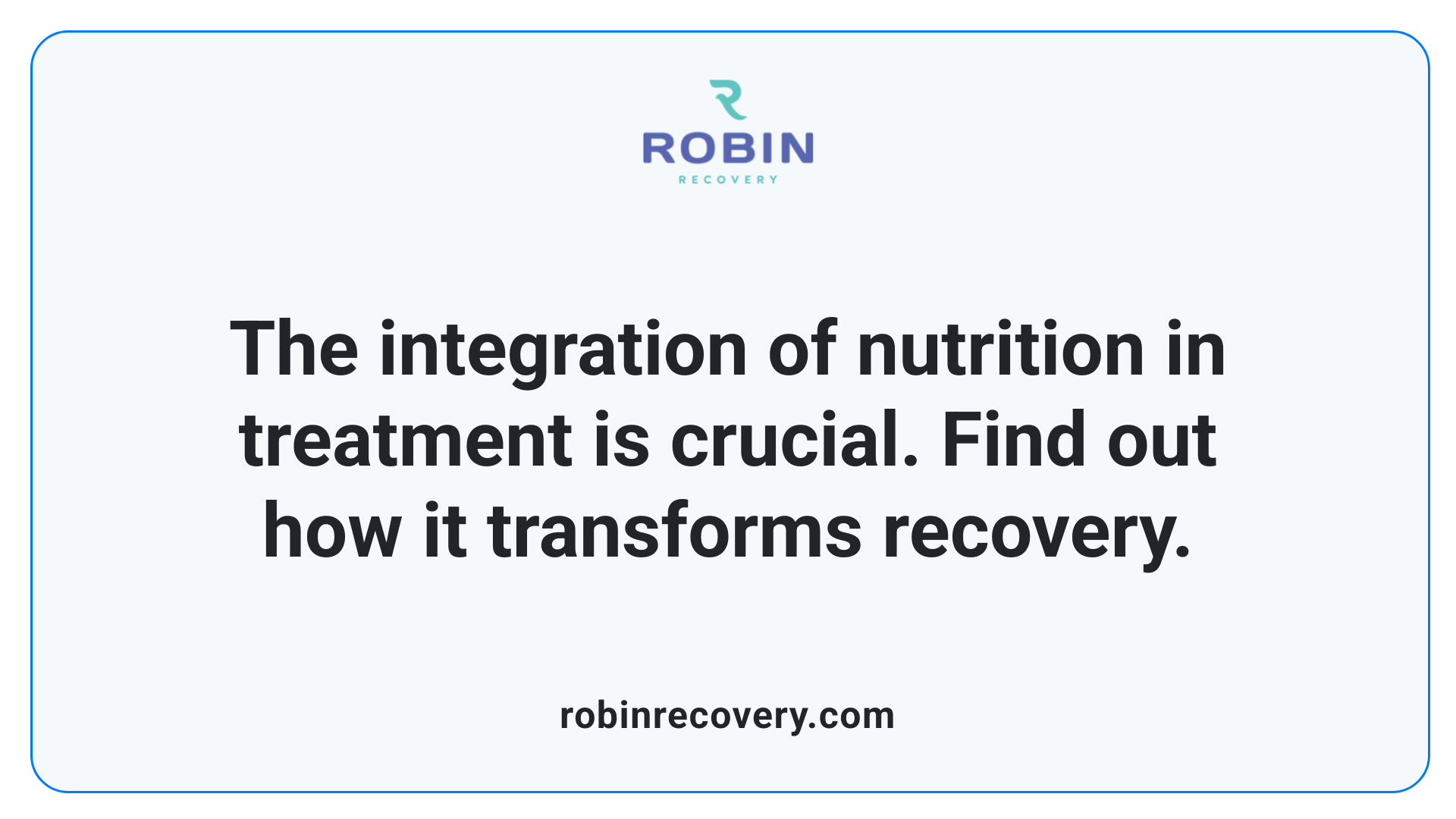The Role of Nutrition Counseling in Addiction Treatment

Introduction to Nutrition Counseling in Addiction Recovery
The journey of addiction recovery is multifaceted, requiring a comprehensive approach that addresses physical health, mental well-being, and emotional stability. Among the various treatment strategies, nutrition counseling stands as a critical component. This approach addresses the nutritional deficiencies caused by substance abuse and promotes healthier lifestyle choices that support recovery. By reinstating a focus on balanced nutrition, individuals are better equipped to manage withdrawal symptoms, stabilize mood, and reduce cravings, thereby enhancing their overall chances of sustained sobriety.
The Importance of Nutrition in Addiction Recovery

Why is nutrition important in addiction recovery?
Nutrition plays a vital role in addiction recovery, addressing both physical and mental health needs of individuals. When someone struggles with addiction, their nutritional status can decline significantly due to poor eating habits and substance-induced deficiencies.
A balanced diet helps repair the damage caused by substances and replenishes essential nutrients that may have been lost. For instance, up to 70% of individuals with alcohol dependence often face nutritional deficiencies that hinder progress in their recovery journey.
Proper nourishment supports brain function by enhancing neuroplasticity, which is crucial for developing healthier coping mechanisms. Nutrients like B vitamins and magnesium are particularly important as they assist in stabilizing mood and managing cravings.
Furthermore, incorporating wholesome foods into a personalized nutrition plan fosters healthy eating habits, which are essential for long-term recovery success. This approach reduces the risk of relapse by promoting overall well-being, restoring physical health, and preventing the emotional symptoms often linked to substance use disorders.
Overall, good nutrition not only aids in physical healing but also addresses the psychological challenges associated with addiction, making it a cornerstone in effective recovery strategies.
Nutritional deficiencies
Nutritional deficiencies are prevalent among individuals in recovery from substance use disorders. Commonly affected nutrients include:
- B vitamins (B1, B6, folic acid): Important for nervous system health and preventing anemia.
- Magnesium: Crucial for muscle function and energy production.
- Zinc: Vital for immune function and cognitive health.
These deficiencies can exacerbate withdrawal symptoms, intensify cravings, and increase the likelihood of relapse unless addressed through tailored nutritional counseling.
The Integral Role of Nutrition Counseling

What role does nutrition counseling play in addiction treatment?
Nutrition counseling plays a crucial role in addiction treatment by addressing both physical and mental health needs, ultimately enhancing recovery outcomes. It helps individuals manage withdrawal symptoms, reduce cravings, and stabilize mood through tailored dietary plans that restore nutrient balance.
Common nutritional deficiencies among those in recovery can exacerbate health issues, making it essential to incorporate proper nutrition into treatment. For instance, deficiencies in vital nutrients like B vitamins and magnesium can worsen mental health symptoms and lead to increased cravings. Nutrition counseling focuses on empowering individuals with knowledge and skills related to healthy eating practices, which can improve their recovery journey significantly.
By encouraging a nutrient-rich diet, nutrition counseling not only aids in physical healing but also supports emotional well-being. Providing education on meal planning and establishing regular eating habits strengthens individuals' coping mechanisms, making them less reliant on substances. Proper nutrition is fundamentally linked to better recovery outcomes, helping prevent relapse and fostering long-term sobriety.
Enhancing recovery outcomes
Effective nutrition interventions can enhance recovery outcomes by addressing malnutrition and promoting overall health. Registered dietitian nutritionists collaborate with individuals to create personalized dietary plans that meet their unique needs. Various types of nutritional counseling, such as medical nutritional therapy and behavioral counseling, are tailored to target specific dietary habits and emotional challenges during recovery.
Maintaining a balanced diet not only supplies essential nutrients for physical health but also stabilizes blood sugar levels, which is crucial for mental clarity. Nutritional support contributes to the repair of damage caused by substance abuse, aids in healing organs, and enhances the immune system.
Addressing deficiencies
Nutritional counseling directly addresses the deficiencies common in individuals with substance use disorders. For example, alcohol abuse often leads to diminished intake of critical nutrients and can impair nutrient absorption, compounding health challenges during recovery. By focusing on rectifying these deficiencies, counseling can help mitigate symptoms of anxiety and depression while improving cravings control.
In summary, nutrition counseling is vital in the multifaceted process of addiction recovery. It empowers individuals to adopt healthier lifestyles, fosters self-sufficiency, and significantly reduces the risk of relapse through sustained emotional and physical support.
Understanding the Impact of Substance Abuse on Nutrition
How does substance abuse affect nutritional health and dietary choices?
Substance abuse significantly disrupts nutritional health and dietary choices, leading to a range of detrimental effects. For individuals grappling with addiction, common behaviors may include significant changes in eating patterns; many tend to prioritize calorie-dense and nutrient-poor foods while often skipping meals. This is especially true for those recovering from alcohol or opioid use, as alcohol abuse damages vital organs like the liver and pancreas, further complicating nutrient absorption.
Nutritional Deficiencies and Their Consequences
The consequences of these dietary choices result in widespread nutritional deficiencies. Research indicates that up to 25% of individuals in substance abuse treatment suffer from malnutrition, particularly affecting essential vitamins and minerals that the body needs for proper function. Deficiencies in B vitamins, zinc, and iron can worsen mental health conditions such as depression and anxiety, exacerbating withdrawal symptoms and cravings.
Importance of Nutritional Support
To facilitate effective recovery, addressing nutritional status is essential. Implementing tailored dietary plans promotes nutrient rehabilitation, restores optimal brain function, and stabilizes mood. This support not only counters malnutrition but also enhances overall health, making it critical for those working toward long-term recovery from addictive behaviors.
The Consequences of Nutritional Deficiencies in Recovery
What impact do nutritional deficiencies have on addiction recovery?
Nutritional deficiencies significantly impact addiction recovery by exacerbating both physical and mental health issues. Individuals with substance use disorders often experience malnutrition due to irregular eating habits and poor food choices. This malnutrition leads to further cravings, complicating recovery efforts and making it more difficult to maintain sobriety.
Essential nutrients, particularly B vitamins, are frequently depleted in those recovering from substance abuse. Low levels of these nutrients can cause severe health problems such as anemia, impaired neurological function, and mood disorders. For example, deficiencies in B1 and folic acid are common in individuals recovering from alcohol dependence.
A balanced diet is crucial during recovery, as it supports the body in healing. Nutrients like magnesium and omega-3 fatty acids play a vital role in regulating mood and reducing cravings. Furthermore, addressing nutritional needs not only aids in restoring physical health but also improves mental well-being.
Ultimately, ensuring that individuals receive adequate nutrition can enhance recovery outcomes and lower the likelihood of relapse, marking nutrition as a fundamental aspect of effective addiction treatment programs.
Nutrition's Role in Supporting Mental and Physical Health

How can proper nutrition aid mental and physical health during addiction recovery?
Proper nutrition plays a vital role in addiction recovery by replenishing the nutrients lost during substance abuse and addressing dietary imbalances. A balanced diet enhances mood, stabilizes energy levels, and supports cognitive function, which are essential for preventing relapse.
Nutrient-dense foods contribute to neurotransmitter production and improve brain health, promoting emotional stability and cognitive clarity. For example, B vitamins and omega-3 fatty acids are crucial for regulating mood and reducing cravings. Establishing regular eating habits can help regulate metabolism and alleviate cravings linked to changes in brain chemistry.
Nutrition and mental health
Good nutrition directly impacts mental health by addressing deficiencies that can lead to anxiety and depression. Many individuals recovering from substance abuse suffer from malnutrition, which exacerbates psychological challenges. A diet rich in whole foods, vitamins, and minerals can significantly improve emotional well-being by fostering resilience against stressors associated with recovery.
Physical health benefits during recovery
In addition to enhancing mental health, proper nutrition aids physical recovery by repairing damage caused by substance abuse. Essential nutrients help restore immune function, promote brain repair, and stabilize blood sugar levels, all of which are crucial for physical healing. Regular meals prevent energy crashes and malnutrition, enabling individuals to regain strength and vitality during their recovery journey.
Nutrient-rich diet benefits
A nutrient-rich diet, including ample proteins, healthy fats, and complex carbohydrates, supports bodily functions critical for recovery. For instance, proteins provide amino acids necessary for neurotransmitter synthesis, while complex carbohydrates help maintain stable energy levels. Furthermore, micronutrients like zinc and vitamin C are vital for immune support and overall health, showcasing the multifaceted benefits of addressing nutritional needs during addiction recovery.
Implementing a Healthy Eating Plan During Recovery

What are practical strategies for implementing a healthy eating plan during recovery?
Implementing a healthy eating plan during recovery is essential for restoring physical and mental health. Here are some practical strategies:
- Balanced Meals: Plan balanced meals that include a variety of food groups such as lean proteins, whole grains, fruits, and vegetables. This helps restore nutrient deficiencies and supports overall health.
- Regular Meal Times: Establish structured eating patterns by setting specific times for meals and snacks. This can stabilize blood sugar levels and prevent cravings.
- Flexibility: While creating meal plans, remain flexible. Adjust meals based on individual needs and the fluctuations that can occur during recovery.
Incorporating nutrient-rich foods such as poultry, fish, bananas, and whole grains can help support mood and stabilize energy levels. Mindful eating, which involves paying attention to hunger and fullness cues, fosters a positive relationship with food.
Cooking at home also encourages healthier eating habits. Moreover, utilizing community resources and sharing meals can provide emotional support, easing feelings of isolation during recovery.
The Growing Recognition of Nutrition in Addiction Treatment Programs

Integration of Nutrition in Treatment
Nutrition has increasingly been recognized as a crucial element in addiction recovery programs. Professionals are now integrating nutritional assessments, education, and personalized meal planning into treatment strategies. This multifaceted approach not only addresses health deficiencies caused by substance abuse but also promotes overall well-being. Targeted dietary changes help individuals stabilize mood, manage cravings, and enhance cognitive function, thus supporting the recovery process.
Holistic Recovery Approaches
Holistic recovery approaches emphasize the interconnectedness of body and mind. In this context, nutrition counseling plays a vital role in restoring physical health while addressing emotional and psychological needs. By focusing on nutrient-rich diets, educational initiatives enable patients to understand how food choices can affect their recovery positively. This encourages healthier coping mechanisms and reinforces the importance of self-care in sobriety.
Public Health Measures
Advocacy for public health measures to standardize nutrition in addiction treatment is growing. Research indicates that establishing nutrition standards could lead to improved recovery outcomes. Integrating a nutritional focus into addiction programs not only streamlines recovery but also addresses long-term health challenges, highlighting the essential role nutrition plays in fostering sustainable sobriety.
Conclusion
In conclusion, nutrition counseling is a transformative component of addiction recovery, addressing the profound impact of substance abuse on physical and mental health through targeted dietary interventions. By prioritizing nutritional health, individuals can better manage withdrawal symptoms, stabilize mood, and reduce the risk of relapse. Comprehensive nutritional strategies not only support bodily healing but also promote emotional resilience and overall well-being. As more treatment programs recognize the pivotal role of nutrition counseling, the integration of personalized dietary plans continues to gain traction, offering hope for sustained recovery and long-term sobriety.
References
- Nutrition Counseling in Addiction Treatment: Role & Types
- The Role of Nutrition in Recovery | Northpoint Colorado
- The Role of Nutrition in Substance Abuse Recovery - Unidine
- What is the Role of Nutrition in Substance Abuse Recovery?
- The Role of Nutrition & Exercise in Addiction Recovery
- The Importance of Nutrition in Addiction Recovery
- Why Nutritional Counseling Is Beneficial in Healing Addiction?
- The Importance of Nutrition in Addiction Recovery
